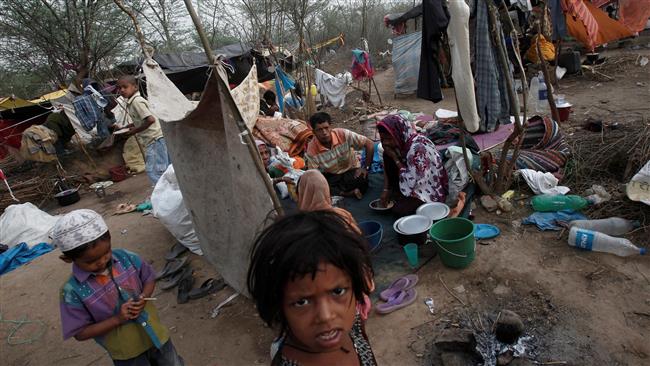
RNA - Kiren Rijiju, a high-profile minister in Prime Minister Narendra Modi's government, said in an interview on the weekend that all of an estimated 40,000 Rohingya Muslims are illegal refugees even those registered with the UN refugee agency.
The junior interior minister stressed that a registration process by the United Nations High Commissioner for Refugees (UNHCR) was irrelevant.
"They are doing it, we can't stop them from registering. But we are not signatory to the accord on refugees," the Indian official said, adding, "As far as we are concerned they are all illegal immigrants. They have no basis to live here. Anybody who is illegal migrant will be deported."
Rijiju, however, declined to comment on the deportation process.
"There's a procedure, there is a rule of law," Rijiju pointed out, stressing, "We can't throw them out just like that. We can't dump them in the Bay of Bengal."
The UNHCR has issued identity cards to about 16,500 Rohingya Muslims in India that it says help them "prevent harassment, arbitrary arrests, detention and deportation."
Reacting to the remarks, the UNHCR's India office said on Monday that the principle of non-refoulement – or not sending back refugees to a place where they face danger – was considered binding on all states whether they had signed the Refugee Convention or not.
The office said it had not received any official word about a plan to deport Rohingya refugees, and had not got any reports deportations were taking place.
Human rights activists have also questioned the practicality of rounding up and expelling thousands of people scattered across the country.
Rijiju told parliament last week that the central government in New Delhi had directed state authorities to identify and deport illegal refugees as well as Rohingya Muslims.
India said on Friday it was in talks with Bangladesh and Myanmar about the deportation plan.
Hundreds of thousands of Rohingya Muslims have fled from Myanmar, with many taking refuge in Bangladesh, and some then crossing a porous border into Hindu-majority India.
Many have also headed to Southeast Asia, often on rickety boats run by people-smuggling gangs.
Some 75,000 people have fled from the Muslim-majority northern part of Rakhine state to Bangladesh since Myanmar’s military launched the crackdown, according to a UN report.
Numerous accounts have already been provided by eyewitnesses of summary executions, rapes and arson attacks against Muslims since the crackdown began. The military has blocked access to Rakhine and banned journalists and aid workers from entering the zone.
The treatment of the roughly one million Rohingya in Myanmar has emerged as the country’s most contentious human rights issue.
Myanmar has long faced international criticism for its treatment of Rohingya Muslims, who are denied citizenship and live in conditions rights groups have compared to those of the Blacks under the former apartheid regime in South Africa.
847/940